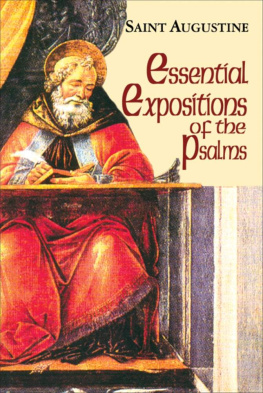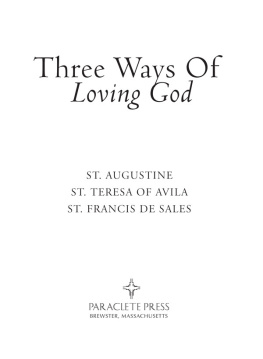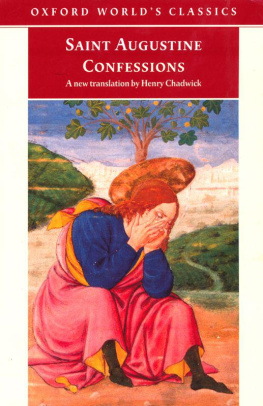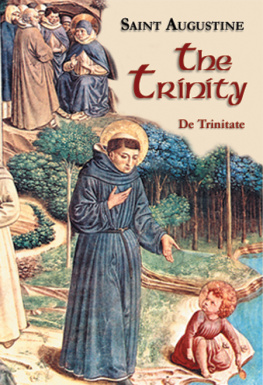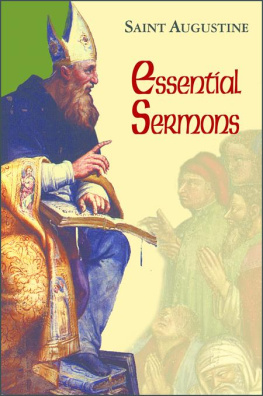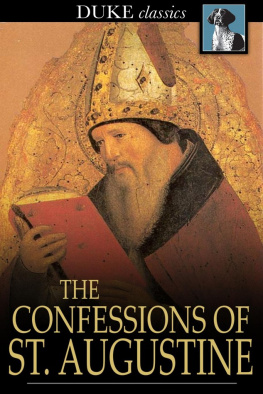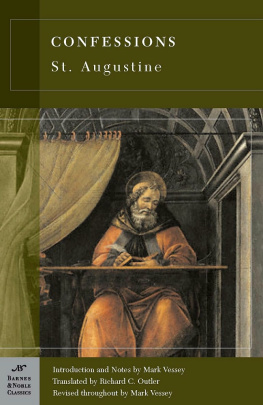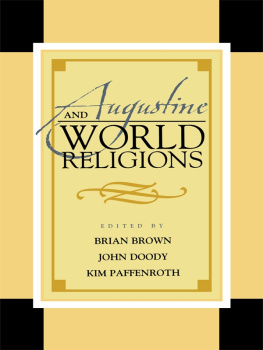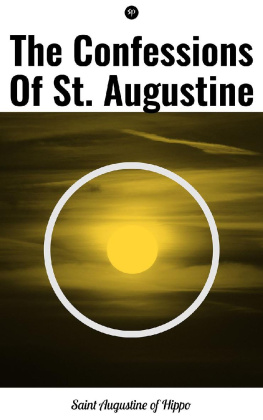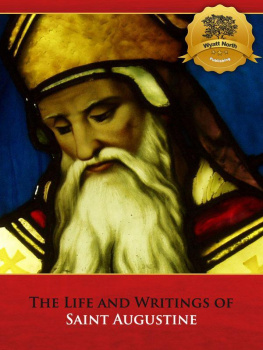CONFESSIONS
ADVISORY EDITOR: BETTY RADICE
ST AUGUSTINE OF HIPPO, the great Doctor of the Latin Church, was born at Thagaste in North Africa, in AD 354. The son of a pagan father and a Christian mother, he was brought up as a Christian, and at the age of sixteen went to Carthage to finish his education for the law. In 375 on reading Cicero's Hortensius he became deeply interested in philosophy. He was converted to the Manichean religion, some of whose tenets he continued to hold after he had founded his own school of rhetoric at Rome, in 383. At Milan he was offered a professorship and came under the influence both of Neoplatonism and of the preaching of St Ambrose. After agonizing inward conflict he renounced all his unorthodox beliefs and was baptized in 387. He then returned to Africa and formed his own community; but in 391 he was ordained priest against his wishes, and five years later he was chosen bishop of Hippo.
For thirty-four years St Augustine lived in community with his cathedral clergy. His written output was vast; there survive 113 books and treatises, over 200 letters, and more than 500 sermons. Two of his longest works, his Confessions and City of God, have made an abiding mark not only on Christian theology but on the psychology and political philosophy of the West since the Dark Ages. He died in 430 as invading Vandals were besieging Hippo.
R. S. PINE-COFFIN, a Roman Catholic, was born in 1917. He was educated at Ampleforth and Peterhouse, Cambridge. He died in 1992.
PENGUIN BOOKS
Published by the Penguin Group
Penguin Books Ltd, 80 Strand, London WC2R 0RL, England
Penguin Putnam Inc., 375 Hudson Street, New York, New York 10014, USA
Penguin Books Australia Ltd, 250 Camberwell Road, Camberwell, Victoria 3124, Australia
Penguin Books Canada Ltd, 10 Alcorn Avenue, Toronto, Ontario, Canada M4V 3B2
Penguin Books India (P) Ltd, 11 Community Centre, Panchsheel Park, New Delhi 110 017, India
Penguin Books (NZ) Ltd, Cnr Rosedale and Airborne Roads, Albany, Auckland, New Zealand
Penguin Books (South Africa) (Pty) Ltd, 24 Sturdee Avenue, Rosebank 2196, South Africa
Penguin Books Ltd, Registered Offices: 80 Strand, London WC2R 0RL, England
www.penguin.com
First published 1961
Copyright R. S. Pine-Coffin, 1961
All rights reserved
Except in the United States of America, this book is sold subject to the condition that it shall not, by way of trade or otherwise, be lent, re-sold, hired out, or otherwise circulated without the publisher's prior consent in any form of binding or cover other than that in which it is published and without a similar condition including this condition being imposed on the subsequent purchaser
eISBN: 9781101487389
Contents
THE CONFESSIONS
ChildhoodAugustine goes to school at Thagaste and later at MadauraHe receives some religious instruction, but even when he is taken gravely ill, his baptism is deferredHe wasa great sinner for so small a boy
He spends a year at home before going to Carthage to continue his studiesThe lust of adolescenceHe robs a pear-tree
He goes to Carthage, where he abandons himself to a life of pleasureCicero's Hortensius inspires him with the love of philosophy - He joins the Manichees as an aspirant - His mother Monica is deeply grieved but finds consolation in a vision
He becomes a teacher of rhetoric at Thagaste and takes a mistressHis interest in astrologyGrief at the death of a close friend leads him to look for consolation in the companionship of other friends at CarthageHe writes a book on Beauty and Proportion
Faustus, a bishop of the Manichees, comes to CarthageAugustine's disappointment on finding that Faustus is unable to settle the discrepancies between the doctrinesof the Manichees and known scientific factsAgainst the wishes of his mother he leaves for Rome, where he still associates with the Manichees but no longer has any firm belief in their doctrinesInstead he is attracted by the teaching of the Neo-PlatonistsHe obtains an appointment as professor of rhetoric in MilanHe listens to the sermons of Saint Ambrose and is impressed but not convincedHis final rejection of the theories of the Manichees
Monica comes to MilanAugustine listens regularly to the sermons of Saint Ambrose and realizes that his previous conceptions of Christian doctrine were mistakenHe learns that Scripture is not always to be understood in a literal senseHis ambitions in the world and difficulties over chastity still prevent him from accepting the faithHe plans to get married and dismisses his mistress
He still has difficulty in thinking of God as a spiritual Being and in finding an explanation of the problem of evil, but is helped by the Platonist booksHe realizes that evil is a perversion of the will, not a substance as the Manichees pretendHe begins to read the Epistles of Saint Paul
He is told of the conversion of Victorinus, the translator of Plotinus, and is eager to follow his example, but worldly ambition and difficulties over chastity hold him backAfter hearing how two officers of the Emperor's court were converted by reading the story of Antony, the Egyptian monk, he goes into the garden of his house, where he hears a child's voice chanting words which he takes to be a divine message to himselfHis conversion is complete and his mother is overjoyed
He resigns his appointment and goes with his friends to a country house at CassiciacumAt Easter the following year he returns to Milan, where he is baptizedWith his mother and his friends he sets out to return to AfricaWhile they are awaiting ship at Ostia Augustine and Monica converse on the life of the saints in heavenThe death of Monica and an account of her life
Augustine asks his readers to thank God for his conversion and to pray for himHe considers the powers of the memorySince all men long for happiness, they must know in some way what it is, but the only true happiness is in GodHe examines his ability to master the various temptations of the bodyIf we have power to resist them, it is by God's graceOnly through Christ, the true Mediator, can we hope to be reconciled with God
An explanation of the first verse of Genesis: In the Beginning God made heaven and earthGod created the world in his Word alone, and therefore by the wordsIn the Beginningwe must understand the Word of God The questionWhat was God doing before he made heaven and earth?is answered by explaining that when there was no creation there was no time It is therefore nonsense to ask what God was doingthenThis leads to a discussion of the problem of time
The meaning of Genesis 1: 1, 2:In the Beginning God made heaven and earth. The earth was invisible and without form, and darkness reigned over the deepHeavenhere means the spiritual creation, the Heaven of Heavens, andearththe formless matter of which the material world was to be made, whereas the heaven above


